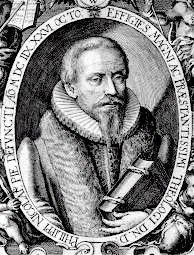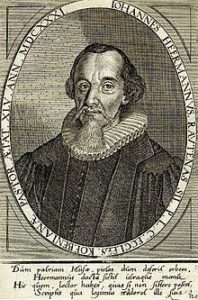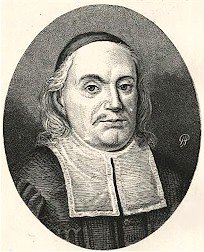Commemoration of Philipp Nicolai, Johann Heermann, and Paul Gerhardt, Hymnwriters
October 26
The Lord be with you
Three of the greatest Lutheran hymnwriters are commemorated together on this date.
Philipp Nicolai was born August 10, 1556, in Mengeringhausen, Waldeck, Germany, the son of a pastor. He studied theology at the universities of Erfurt and Wittenberg (1575-1579). In 1583 he became pastor in Herdecke near Dortmund where his father had introduced the Reformation. The town council was Roman Catholic, and, when the Spanish invaded and the Roman Mass was reintroduced, Nicolai was forced to flee. He seems to have served secretly as a pastor in Cologne in 1586, holding services in members’ homes. (Gerhardt did  the same in Berlin.) At the end of 1586, he was appointed deacon (cleric of minor orders) at Niederwildungen, and in 1587 became pastor there. In November 1588 he was the pastor at Altwildungen, court preacher to the Countess Margaretha of Waldeck, and tutor to her son. In 1594 he at last received his D.D. degree from Wittenberg. The degree had been delayed because of controversy with the Crypto-Calvinists. (Crypto-Calvinists were individuals who claimed to be Lutherans, all the while seeking to supplant a Lutheran understanding of the Scriptures with Calvinist/Reformed theology. “Crypto” means hidden.)
the same in Berlin.) At the end of 1586, he was appointed deacon (cleric of minor orders) at Niederwildungen, and in 1587 became pastor there. In November 1588 he was the pastor at Altwildungen, court preacher to the Countess Margaretha of Waldeck, and tutor to her son. In 1594 he at last received his D.D. degree from Wittenberg. The degree had been delayed because of controversy with the Crypto-Calvinists. (Crypto-Calvinists were individuals who claimed to be Lutherans, all the while seeking to supplant a Lutheran understanding of the Scriptures with Calvinist/Reformed theology. “Crypto” means hidden.)
In October 1596 Nicolai became pastor in Unna in Westphalia. It was a time of distress: between July 1597 and January 1598, the plague took thirteen hundred of his parishioners, sometimes thirty in a day, three hundred in July and 170 in one week in August. The parsonage overlooked the graveyard and Nicolai could not avoid the constant presence of death. He wrote a series of meditations to comfort his people, Mirror of Joy (the preface was dated August 10, 1598, his forty-third birthday), and to this book, published in 1599, he appended two chorales. One was “Wake, Awake, for Night is Flying,” based on Matthew 25. (It is hymn 516 in the Lutheran Service Book.) It has been called “the king of chorales.” The other was “O Morning Star, How Fair and Bright,” based on Psalm 45. (It is hymn 395 in the Lutheran Service Book.) This, “the queen of chorales,” written in the space of a few hours, immediately established itself as a favorite in Germany and came to be regarded as an almost indispensable part of the wedding service. Nicolai’s fame as a hymnwriter rests upon these two hymns.
In December 1598, the Spanish army again invaded, and Nicolai was forced to flee once more. He returned in April of the following year. In 1601 he was made pastor of St. Katherine’s Church in Hamburg, where he endeared himself to the people with his pastoral concern and won their respect as a courageous and powerful preacher. He was called a “second Chrysostom.” (Chrysostom is commemorated January 27.) In 1596-1597 he wrote a two-volume biblical-theological apocalyptic work on the kingdom of Christ. He was also the author of polemical writings against the Crypto-Calvinists and the Reformed in his impassioned defense of Lutheran orthodoxy. Nonetheless, he was personally gentle and irenic (irenic: favoring, conducive to, or operating toward peace, moderation, or conciliation), with a mystical inclination.
Following an ordination at St. Katherine’s on October 22,1608, he returned home ill. His illness grew worse, and Philipp Nicolai died on October 26. It is on this day we remember these hymnwriters.
Johann Heermann was born at Raudten, Silesia, October 11, 1585, his parents’ only surviving child. His father was a furrier. The son suffered a severe illness as a child, and his mother vowed that if he recovered, he would be educated for the ministry.
After servi ng as a tutor, he was appointed deacon at Koben, a village near Raudten. Within six months he was elevated to the pastorate of the parish in 1611. An affliction of the throat in 1634 forced him to stop preaching. For four years his preaching was done by assistants, and in 1638 Heermann retired to Lissa and died there on Septuagesima Sunday (the third Sunday before Lent), February 17,1647. Many though he had been poisoned. (The name “Septuagesima” is still used in the LC-MS by those who use the one-year lectionary, but isn’t used in the three-year lectionary. It is taken from the first word in the old Latin Introit.)
ng as a tutor, he was appointed deacon at Koben, a village near Raudten. Within six months he was elevated to the pastorate of the parish in 1611. An affliction of the throat in 1634 forced him to stop preaching. For four years his preaching was done by assistants, and in 1638 Heermann retired to Lissa and died there on Septuagesima Sunday (the third Sunday before Lent), February 17,1647. Many though he had been poisoned. (The name “Septuagesima” is still used in the LC-MS by those who use the one-year lectionary, but isn’t used in the three-year lectionary. It is taken from the first word in the old Latin Introit.)
Heermann had suffered not only from poor health but also from the deprivations of the Thirty Years’ War. Koben was devastated by fire in 1616, plundered four times by Roman Catholic troops between 1629 and 1634, and suffered pestilence in 1631. Heermann was driven from his home and forced to flee again and again, loosing all his movable possessions and, on at least three occasions, narrowly escaping death. From this unending affliction, Heermann was able to write hymns of confident faith that have been sung and loved by succeeding generations. As a hymnwriter of the seventeenth century, he ranks second only to Gerhardt. His hymns, John Julian observes, mark a transition from the objective hymns of the Reformation to the more subjective type and are characterized by a depth of feeling and tenderness that is unsurpassed.
Heerman wrote over 400 hymns. Six of them are included in the Lutheran Service Book (421, 439, 568, 696, 774, 839). One of my all time favorite hymns, “O Dearest Jesus, What Law Hast Thou Broken,” is one of Heerman’s. (That more of his hymns are not included points out a problem faced by anyone seeking to produce a hymnal. There are so many good hymns, both old and new, that you simply cannot include them all in one hymnal.)
Paul Gerhardt, without much doubt the greatest Lutheran hymnwriter, was born March 12, 1607, at Grafenhaynichen, near Wittenberg. His father, the mayor of the town, died while his son was still young. Gerhardt studied theology at the University of Wittenberg from 1628 to 1642. The Thirty Years’ War was raging, and it was a time of suffering and desolation. Gerhardt went to Berlin as a tutor in the home of Andreas Barthold and in 1655 married Barthold’s da ughter, Anna Maria. His contact with Johann Cruger, the cantor at St. Nicholas’ Church in Berlin, stimulated his poetic gifts, and eighteen of his hymns appeared in the third edition of Cruger’s hymnal.
ughter, Anna Maria. His contact with Johann Cruger, the cantor at St. Nicholas’ Church in Berlin, stimulated his poetic gifts, and eighteen of his hymns appeared in the third edition of Cruger’s hymnal.
When he was forty years old, Gerhardt obtained an appointment as Probst (chief pastor) at Mittenwald in Brandenburg, near Berlin, and was ordained November 8, 1651. He became the third assistant at St. Nicholas’ Church in Berlin in 1657, and there he gained fame as a preacher. In doctrinal debates with the Reformed, he maintained the Lutheran position. He refused to sign a pledge not to bring doctrinal discussion into sermons and was deposed by Frederick William of Brandenburg-Prussia in 1666. Although he was restored to his position in the following year, he refused to return and remained without a parish for some years. During this time of trial, his wife and a son died (three of their children had died earlier), and his misery increased. In May 1669 he was appointed archdeacon of Lubben. He lived there with a sister-in-law and his sole surviving son in a somewhat unsympathetic parish. He died May 27, 1676.
Amid affliction and the calamities of the Thirty Years’ War and its aftermath, Gerhardt wrote some 133 hymns of faith and confidence. He was, moreover, able to translate orthodox doctrines in such a way that people could experience them with emotional warmth. In the church at Lubben there is a life-sized portrait of Gerhardt with the inscription beneath it, “A Divine [i.e., Theologian] sifted in Satan’s sieve” (cf. Luke 22:31).
The Lutheran Service Book has seventeen of his hymns (334, 360, 372, 375, 438, 450, 453, 467, 596, 683, 724, 726, 737, 754, 756, 880). Perhaps his best know hymn was his German translation and versification of a larger work by Bernard of Clairvaux, “O Sacred Head, Now Wounded.” The great hymn about life as a baptized believer, “All Christians Who Have Been Baptized” is his, along with the wonderful hymn that encourages us when facing various trials, “If God Himself Be for Me.” Along with Martin Luther, Gerhardt is regarded as one of Lutheranism’s finest hymnhwriters.
Collect for the Commemoration of Philipp Nicolai, Johann Heermann, and Paul Gerhardt, Hymnwriters: Almighty God, the apostle Paul taught us to praise You in psalms and hymns and spiritual songs. We thank You this day for those who have given to Your Church great hymns, especially Your servants Philipp Nicolai, Johann Heerman, and Paul Gerhardt. May Your Church never lack hymnwriters who through their words and music give You praise. Fill us with the desire to praise and thank You for Your great goodness; through Jesus Christ, our Lord, who lives and reigns with You and the Holy Spirit, one God, now and forever. Amen.
Other things these saints might inspire us to pray about:
• For grace to sing in distress and in joy
• For preachers of the gospel
• For confidence and faith
• For a gentle spirit
• For those who continue to provide new hymns for the Church
• For the strength to remain faithful during difficult times
Blessings in Christ,
Pastor John Rickert
